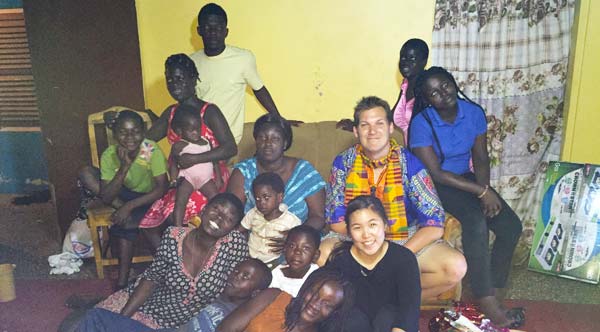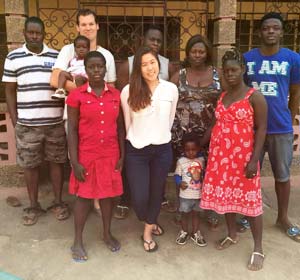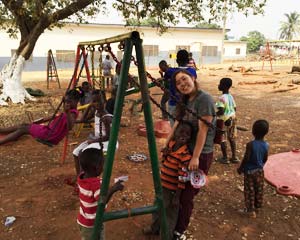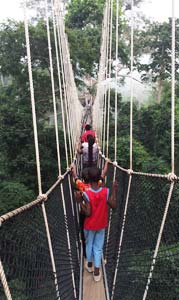Christi - Ghana

Christi Grows in Ghana
Nervous about traveling alone to a new, exotic country? You might want to learn from Christi’s experience.
“I knew I wanted to do something different, and go somewhere unusual,” says the pre-med at Wesleyan University. “At the same time, I was worried, since I’ve never really traveled internationally by myself.”
Christi was intrigued by Ghana when she read online that its friendly, welcoming people made it a perfect introduction to Africa. Despite some apprehension, she signed up for an ELI Abroad orphanage placement during her 4-week Christmas break.
“I’ll admit, I was very scared when I was flying into Accra,” Christi says. “It just hit me, I’m going to Africa, and I’m about the only non-African on the plane!”
 Of course, this is a normal response: many novice volunteers and interns feel out-of-place when they’re suddenly plopped in such a dramatically different setting. Christi knew that intellectually, but still had to adjust.
Of course, this is a normal response: many novice volunteers and interns feel out-of-place when they’re suddenly plopped in such a dramatically different setting. Christi knew that intellectually, but still had to adjust.
What helped? Other volunteers and the warmth of the people of Ghana.
After arriving at Ghana’s capital for her orientation, Christi was placed in a hostel with four other young women, including a couple of Nigerians. “That was really nice,” she remembers. “They talked to me, showed me around a bit, and made me feel like I wasn’t really alone.” During her orientation, as she saw a bit of Accra, visited a local beach, and learned a few basic phrases in Twi, the local language spoken by many Ghanaians (the official language is English,) Christi began relaxing, her culture shock slowly easing. A few days later, Christi was on the road again, this time traveling four hours by bus to Kumasi, the second largest city in Ghana, where she would work in a local orphanage.
“In Kumasi, I was immediately embraced by my host family.”
Accustomed to hosting international volunteers, this large, extended clan quickly made Christi feel at ease. She had her own room, but she enjoyed the near constant presence of various relatives, neighbors and local children.
"I come from a small family,” she laughs. “So this was so different. But at the same time, really fun and very social.”
She bonded with her host dad over American music. “He was interested in a lot of contemporary music, including R&B and hip hop. I’m not an expert, but I do know enough to have good conversations about it.”
Her host mom encouraged Christi to feel at home with the extended family, inviting her to go to church with them, and even to help in the kitchen. Initially shy, Christi at first declined many invitations before deciding to go for it. Helping with the cooking was enlightening. The food - basics such as rice, beans, stews and lots of dishes with plantains - was made the old fashioned way, hand ground and often cooked over an open flame.
“My host mom is an excellent cook, and very, very nice, so I learned a lot and really enjoyed helping her in the kitchen.” Christi also chose to eat with her hands, like everyone else.
“I could have asked for utensils but I thought, I’m in Ghana, I should just embrace the experience.”
That insight made all the difference. Opening herself to this new world, Christi became a part of it.
 To her surprise, another orphanage volunteer happened to be living with the host family as well. The young man from Belgium showed Christi around the area, went with her by bus to work, and generally eased her transition. Not that Christi would have been without support otherwise. Her host mom and dad, their various friends and many relatives all looked out for her.
To her surprise, another orphanage volunteer happened to be living with the host family as well. The young man from Belgium showed Christi around the area, went with her by bus to work, and generally eased her transition. Not that Christi would have been without support otherwise. Her host mom and dad, their various friends and many relatives all looked out for her.
“It’s true what they say about the people in Ghana. They’re very friendly and caring. If anyone saw me looking confused, they’d try to help out right away. They’d give me their cell phone number and tell me, ‘If you get lost or need anything, call me right away.’”
Orphanage work kept her busy from 8-2. Christi was placed in the nursery, where she helped the house mothers change diapers, feed the youngsters, engage and play with them.
“I love kids and I want to be a pediatrician,” she says. “But I’ll tell you, this was exhausting work! The kids were wonderful but very energetic, and I would come home just wiped out.”
Afternoons and evenings were spent relaxing with her host family, or quietly with a book. (“It was nice to be unplugged.”) Weekends included sightseeing in town, or spontaneous trips to the coast. One particular trip was especially memorable, and very unique: a close friend of the host family took her into the country, to an off-the-beaten-path village where Christi met and spoke with a local chief.
“I’d never have an experience like that if I’d been an ordinary tourist or not living with a family.”
By the end of her four weeks in Ghana, leaving wasn’t easy.
“I shed a few tears. I had such an amazing experience and I grew so attached to this family.”
Now back in the U.S. and her university, a more confident and worldly Christi has absolutely no regrets.
"I’m so glad I chose Ghana.”
 Christi’s Tips for Prospective Ghana Volunteers
Christi’s Tips for Prospective Ghana Volunteers
- Be open. Try not to have any expectations, because there’s nothing similar between the U.S. and Ghana.
- Do stuff. Accept your host family’s invitations, and try to become part of the family. It will enrich your stay and offer opportunities you might otherwise miss out on.
- Pack light. You can buy basics in Ghana. Conversely, you might consider bringing some clothes you or your family don’t need anymore and leave them for your host family.
- Dress respectfully. Guys can get away with shorts in Ghana, but female volunteers shouldn’t wear them outside of the home. Wear longer skirts or wide, light pants, since it’s often too hot for jeans. Short sleeves are OK, but tank tops aren’t appropriate. Bring one nicer dress with you in case you’re invited to church, something I definitely recommend since it’s such a big part of life in Ghana.
- Learn a bit of Twi. That was one of the best things during my orientation. It’s helpful, and it shows you respect the local culture.
Interviews
- ARGENTINA - HIV
- BRAZIL - Wildlife
- BRAZIL - Wildlife
- CAMBODIA - Buddhist Monks
- CAMBODIA - Children
- CAMBODIA - Microfinance
- CHILE - Literature
- CHILE - Equine Therapy
- CHINA - Journalism
- CHINA - Urban Planning
- ECUADOR - Medical
- ECUADOR - Teaching
- ECUADOR - Physical Therapy
- ECUADOR - Veterinary
- ECUADOR - Youth
- GHANA - Orphanage
- GUATEMALA - Teaching
- INDIA - Women's Programs
- INDIA - Health & Youth
- INDIA - Journalism
- INDIA - Women's Empowerment
- IRELAND - Art Gallery
- IRELAND - Art
- IRELAND - Law
- IRELAND - Museums
- IRELAND - PR
- IRELAND - Veterinary I
- IRELAND - Veterinary II
- MEXICO - Youth
- NEPAL - Construction
- NEPAL - Orphanage
- NEPAL - Orphanage
- NEPAL - Veterinary
- NICARAGUA - Teaching
- NICARAGUA - Unwed Mother Support
- PERU - Teaching
- PHILIPPINES - Nutrition
- PHILIPPINES - Nutrition
- PORTUGAL - Fighting Food Waste
- PORTUGAL - Housing for the Poor
- SOUTH AFRICA - Public Health
- SOUTH AFRICA - Public Health
- SOUTH AFRICA - Engineering
- SOUTH AFRICA - Nutrition
- THAILAND - Elephant Camp
- THAILAND - Elephant & Medical
- THAILAND - Journalism
- THAILAND - Physical Therapy
- UGANDA - Medical
- UGANDA - Medical
- UGANDA - Medical
- UGANDA - Microfinance
- VIETNAM - Pharmacy
- VIETNAM - Women

